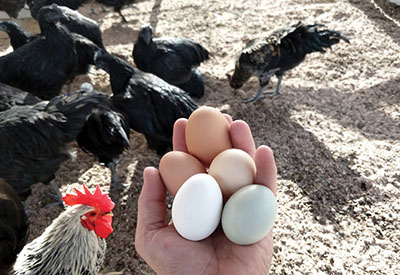Guide E-218
Cydney Martin
College of Agricultural, Consumer and Environmental Sciences, New Mexico State University
Author: Former Extension Agent, Santa Fe County Extension Office, New Mexico State University. (Print Friendly PDF)
If you buy fresh eggs or have your own poultry flock, you most likely appreciate the freshness of the eggs. However, the porous nature of the eggshell still makes it prone to bacterial contamination, regardless of the source of the eggs. You must be diligent about egg safety due to possible Salmonella contamination and other health concerns.
Penn State University conducted a large survey looking at the prevalence of Salmonella in eggs that were purchased from farm stands across Pennsylvania. These eggs were from small chicken flocks, which fall outside of U.S. Food and Drug Administration regulations for controlling Salmonella. The survey found that 2% of the eggs tested were positive for Salmonella enteritidis, a major food-borne pathogen (Mulhollem, 2016). The contamination was primarily found inside the egg. For commercial egg producers, this number is less than 0.5%.
© Daniel Tuttle | Unsplash.com
Questions to Ask a Seller
If you buy fresh eggs, be sure to ask the seller how the eggs are handled and what sanitary and safety precautions they take. Ask them how often they collect the eggs (it should be at least twice per day) and how they clean the eggs. They should never be collected from a floor, and the coop should be kept cool.
Handling Fresh Eggs for Consumption
- Don’t wash or sand the eggs. Only wipe them off gently with a dry paper towel and discard the towel.
- Don’t collect eggs in the same container in which you collect other items. The ideal container is an egg carton.
- Never soak fresh eggs.
- Wash your hands often, and keep your work area clean and disinfected. Keep fresh eggs separate from other food items.
- Discard eggs that have cracks or more than a dime-sized amount of manure on them. Keep nesting boxes clean.
- Keep your eggs refrigerated. Do not leave them at room temperature for longer than two hours.
- Cooking eggs to 160°F should kill any Salmonella that is present.
- Use pasteurized eggs when making food that contains raw or lightly cooked eggs, such as hollandaise sauce, Caesar salad dressing, or tiramisu. All store-bought egg products are pasteurized, as required by United States Department of Agriculture’s (USDA) Food Safety and Inspection Service (FSIS). This means that they have been rapidly heated and held at a minimum required temperature for a specified time to destroy bacteria.
For more information on keeping your own small poultry flock, see NMSU Extension Circular 477, Small Poultry Flock Management (https://pubs.nmsu.edu/_circulars/CR477.pdf).
References
Centers for Disease Control and Prevention. 2022, March 17. Salmonella and eggs. https://www.cdc.gov/foodsafety/communication/salmonella-and-eggs.html
Mulhollem, J. 2016, September 14. Eggs from small flocks more likely to contain Salmonella enteritidis. Penn State News. https://www.psu.edu/news/research/story/eggs-small-flocks-more-likely-contain-salmonella-enteritidis/
U.S. Department of Agriculture, Food Safety and Inspection Service. 2019, November 4. Shell eggs from farm to table. https://www.fsis.usda.gov/wps/portal/fsis/topics/food-safety-education/get-answers/food-safety-fact-sheets/egg-products-preparation/shell-eggs-from-farm-to-table/ct_index
For Further Reading
E-118: Storing Food Safely
https://pubs.nmsu.edu/_e/E118/index.html
E-216: Making Homemade Cheese
https://pubs.nmsu.edu/_e/E216/index.html
E-508: Storing Food Safely
https://pubs.nmsu.edu/_e/E508/index.html
To find more resources for your business, home, or family, visit the College of Agricultural, Consumer and Environmental Sciences on the World Wide Web at pubs.nmsu.edu
Contents of publications may be freely reproduced, with an appropriate citation, for educational purposes. All other rights reserved. For permission to use publications for other purposes, contact pubs@nmsu.edu or the authors listed on the publication.
New Mexico State University is an equal opportunity/affirmative action employer and educator. NMSU and the U.S. Department of Agriculture cooperating.
February 2023 Las Cruces, NM



